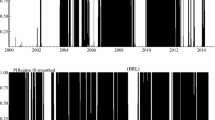Abstract
This paper seeks to empirically determine whether feedback trading strategies result in stabilization or destabilization in the foreign exchange market and if such strategies are a distinctive characteristic of an emerging economy or they are a common element to both developed and emerging economies. These hypotheses are tested via the use of a feedback model augmented with a generalized autoregressive conditional heteroskedasticity (GARCH) process for modeling the errors. The results suggest presence of both positive and negative feedback trading and asymmetric behavior in both types of economies. Irrespective of the nature of feedback trading, presence of asymmetric behavior implies that market traders rely on central banks to intervene so they can realize short-term profits. Finally, in cases of a positive first-order autoregressive parameter presence of the bandwagon effect is implied, whereby past currency movements are followed by expectations of currency movements in the same direction.
Similar content being viewed by others
Notes
It can be noted here that it may well be the case that may not be the central bank that causes the unexpected outcomes but rather some unknown private sector participant(s). This point was raised by a referee.
References
Aguirre MS, Saidi R (1999) Feedback trading in exchange-rate markets: evidence from within and across economic blocks. J Econ Finance 23(1):1–14
Allen H, Taylor MP (1990) Charts, noise and fundamentals in the London foreign exchange market. Econ J 100(Suppl):49–59
Atchison AD, Butler KC, Simonds RR (1987) Nonsynchronous security trading and market index autocorrelation. J Finance 42:111–118
Baillie R, Bollerslev T (1991) Intra-day and inter-market volatility in foreign exchange rates. Rev Econ Stud 58:565–585
Booth CG, Hatem J, Vitranen I, Yli-Olli P (1992) Stochastic modeling of security returns: evidence from the Helsinki stock exchange. Eur J Oper Res 56:98–106
Boudoukh J, Richardson MP, Whitelaw RF (1994) A tale of three schools: insights on autocorrelation of short-horizon stock returns. Rev Financ Stud 7(3):539–573
Campbell JY, Grossman SJ, Wang J (1993) Trading volume and serial correlation in stock returns. Q J Econ CVIII(4):905–939
Chan K (1993) Imperfect information and cross-qutocorrelation among stock prices. J Finance 48(4):1211–1230
Choe HK, Bong C, Stulz RM (1999) Do foreign investors destabilize stock markets? The Korean experience in 1997. J Financ Econ 54(2):227–264
Conrad J, Kaul G (1988) Time variation in expected returns. J Bus 61:409–425
Cutler DM, Poterba JM, Summers LH (1991) Speculative dynamics. Econ Stud 58:529–546
Engle RF, Ng VK (1993) Measuring and testing the impact of news on volatility. J Finance 48:1749–1789
Fama EF, French KR (1988) Permanent and transitory components of stock prices. J Polit Econ 96:246–273
Farmer DJ, Joshi S (2000) The price dynamics of common trading strategies. J Econ Behav Organ 49(2):149–171
Frankel JA, Froot KA (1987) Using survey data to test standard propositions regarding exchange rate expectations. Am Econ Rev 77:133–153
Hung J (1997) Intervention strategies and exchange rate volatility: a noise trading perspective. J Int Money Financ 16:779–793
Koutmos G (1997) Feedback trading and the autocorrelation pattern of stock returns: further empirical evidence. J Int Money Financ 16:625–636
Koutmos G, Saidi R (2001) Positive feedback trading in emerging capital markets. Appl Financ Econ 11:291–297
Kyle AS (1989) Informed speculation with imperfect competition. Rev Econ Stud 56:317–356
Laopodis NT (2005) Feedback trading and autocorrelation interactions in the foreign exchange market: further evidence. Econ Model 22:811–827
LeBaron B (1992) Some relations between volatility and serial correlations in stock market returns. J Bus 65:199–219
Lo AW, MacKinlay AC (1988) Stock market prices do not follow random walks: evidence from a simple specification test. Rev Financ Stud 1:41–66
Madrigal V (1996) Non-fundamental speculation. J Finance 51:553–578
Mech TS (1993) Portfolio return autocorrelation. J Financ Econ 34:307–344
Nelson D (1991) Conditional heteroscedasticity in asset returns: a new approach. Econometrica 59:347–370
Ogden JP (1997) Empirical analyses of three explanations for the positive autocorrelation of short-horizon stock index returns. Rev Quant Financ Account 9(2):203–217
Sentana E, Wadhwani S (1992) Feedback traders and stock return autocorrelations: evidence from a century of daily data. Econ J 102:415–425
Shiller RJ (1984) Stock prices and social dynamics. Brookings Pap Econ Act 2:457–498
Vitale P (2000) Speculative noise trading and manipulation in the foreign exchange market. J Int Money Financ 19:689–712
Author information
Authors and Affiliations
Corresponding author
Additional information
The author is indebted to a referee whose criticisms greatly improved the focus and flow of the paper and the journal’s finance editor, Richard M. Robinson. The usual disclaimer applies. This paper has benefited from a 2002 research grant from the Dolan School of Business, Fairfield University.
Rights and permissions
About this article
Cite this article
Laopodis, N.T. Noise trading and autocorrelation interactions in the foreign exchange market: Evidence from developed and emerging economies. J Econ Finan 32, 271–293 (2008). https://doi.org/10.1007/s12197-007-9018-y
Published:
Issue Date:
DOI: https://doi.org/10.1007/s12197-007-9018-y




